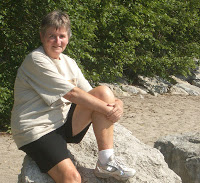I was probably lonely as a child. I had good friends at school but when school was out I had no nearby children to play with, and I had no siblings. But I don’t recall ever feeling lonely as I was always accompanied by friends from books. (I originally wrote ‘from fiction’ but as The Bible was one of the few books available to me, I imagine some might take exception to including The Bible as fiction.)
I say few books were available not because of any failure on the part of my family to love books, but because paper was scarce in post-war Britain and so few books were published. There was a library in the local town but that was a long and infrequent bus ride away.
So my personal book collection contained four Winnie the Pooh books, published long before the war and once belonging to my mother, an old and very tattered family Bible, and a book called Mystery at Witchend by Malcolm Saville, a prolific author of children’s books in Britain in the 1940’s and ’50’s.
So I roamed the countryside accompanied sometimes by the roly poly Pooh and a bouncing Tigger, sometimes by all or some of the five children from Witchend who formed The Lone Pine Club and together had many harmless adventures and solved gentle crimes with never a hint of violence. Indeed the only violence I ever read about was in The Bible. But the Jesus who occasionally accompanied me was the gentle fatherly figure depicted in The Children’s Pictorial Bible which we read in Sunday School. Because of one of the pictures in this book, my friend Jesus always had a lamb draped around his neck like a fat wooly scarf. Looking back I rather suspect that my child mind had confused the picture of Jesus with one of the shepherds greeting His birth, but never mind. As Jesus and I frequently walked through fields dotted with grazing sheep my vision was appropriate enough.
Fast forward a few decades. I am in my early forties and finally coming out to myself, and very shortly after, to others. So. I was homosexual. A lesbian. What did that mean? Obviously I knew the meaning of the words, the definition, but what did it mean? To me, to my life. Where did I go from here? I felt very alone. Who could I talk to about all this? My friends might be very supportive, but what could they tell me? No-one I knew would have any answers.
So of course I turned to books and headed for the library. This was before the advent of internet so I searched through the catalog card files, in their long narrow boxes, for the pertinent categories. Although I was ‘out’ to anyone who mattered, I must confess to peeking furtively over my shoulder as I searched the LESBIAN section, the word seeming about a foot high and glaringly obvious to all who passed by.
There was amazingly little available regarding lesbians at that time, fiction or non-fiction.
What little there was, was awful. I rushed home with the few books on the library shelf, avidly read them, and wondered why I had bothered. Beyond depressing, they were just plain frightening. If this was where I was headed, I was in serious trouble. The Well of Loneliness, by Radcliffe Hall, was my introduction to lesbian fiction; one of the most depressing books I have ever read. The title alone, if you know that is the road you are now taking, is enough to to make you rush back in the closet and throw away the key. This book has become something of ‘classic’ in the lesbian world, in the sense that most of us have read it, though not a ‘classic’ in a positive sense as any mention of it is greeted by groans. I don’t recall now the titles of the other few books, but in all of them the lesbian character seemed destined for a life of abject misery, or suicide, or else they are saved by a return to heterosexuality. My reaction to this introduction to lesbian fiction was, essentially, what the hell have I done??
So, lacking new characters to jump from the pages and accompany me, I thought longingly of my childhood buddies. Somehow I didn’t think they would be much help. Pooh Bear would just sink his chubby head further into his honey pot, Tigger and Kanga are too busy bouncing and hopping to listen. Eeyore would say, as always,
‘It doesn’t matter anyway.’
But it does. It matters very much.
Those kids from the heterogeneous, clean-scrubbed families of Witchend, would look ascanse at each other and say,
‘Oh dear oh dear but this is awfully difficult,’
and probably run home to mother.
I, who do not identify as a Christian, actually did have a little chat with Jesus. And He actually helped. Asking myself the question what would Jesus do, I answered myself, with every confidence, that he would love me and accept me whoever and whatever I am.
Pretty soon, I discovered Beebo’s bookstore in Louisville and discovered that there really were positive portrayals of fictional lesbians. Claimed as the first of these is Patricia Highsmith’s The Price of Salt, in which neither of the two women has a nervous breakdown, dies tragically, faces a lonely and desolate future, commits suicide, or returns to being with a male. But by then I no longer had need for fictitious playmates. Women at Beebo’s had introduced me to the life-saving – or at least lesbian-saving – Boulder group TLC, The Lesbian Connection, which in turn introduced me to many wonderful women; real women, who in turn led me to my Beautiful Betsy.
With a real woman like that, who needs fiction?
© November 2017
About the Author
I was born and raised in England. After graduation from college there, I moved to the U.S. and, having discovered Colorado, never left. I have lived in the Denver-Boulder area since 1965, working for 30 years at IBM. I married, raised four stepchildren, then got divorced after finally, in my forties, accepting myself as a lesbian. I have been with my wonderful partner Betsy for thirty years. We have been married since 2013.



